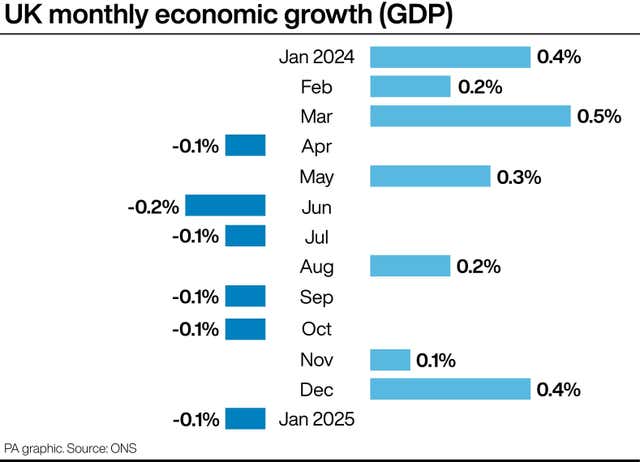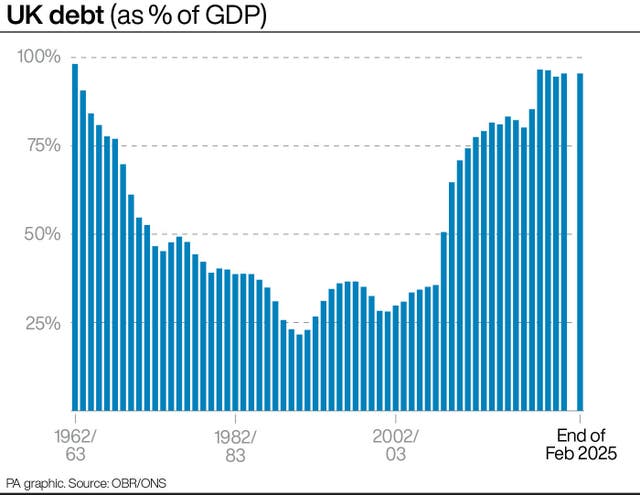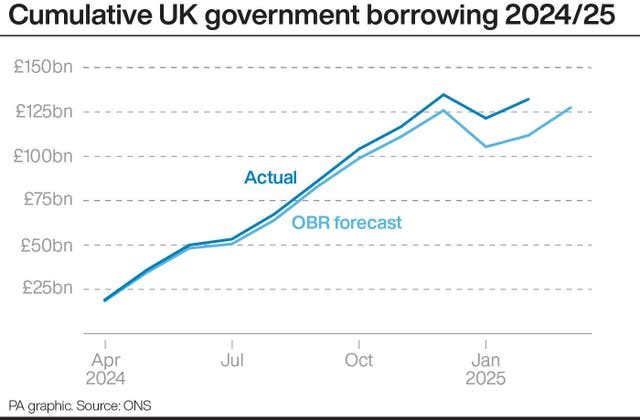
Natasha Devon 6pm - 9pm
26 March 2025, 09:24

Chancellor Rachel Reeves will acknowledge she needs to go ‘further and faster to kickstart growth’ in her spring statement .
Rachel Reeves will be forced to make further welfare cuts as she seeks to balance the books after the budget watchdog said the Government’s plans will not save as much as ministers hoped.
The Chancellor will set out the measures as she delivers her spring statement in response to a gloomy economic assessment by the Office for Budget Responsibility (OBR).
The watchdog’s assessment is that changes to disability and incapacity benefits will save £3.4 billion in 2029/30 rather than the more than £5 billion claimed by ministers.
Asked about the shortfall Cabinet minister John Healey told Times Radio: “That’s a calculation we may see confirmed by the Office for Budget Responsibility about the longer-term savings that our plans to change the welfare system may bring.”
Defence Secretary Mr Healey said: “You can’t have a benefits system that is failing people and out of control in this way.
“That’s why the plans that (Work and Pensions Secretary) Liz Kendall laid out last week, and that you’ll hear more from the Chancellor this afternoon in the spring statement, are so important.”
With mounting unease on the Labour benches about the scale of the welfare cuts, The Times reported that Ms Reeves will not attempt to make up the entirety of the £1.6 billion shortfall but will instead set out plans to save a further £500 million.
Universal credit incapacity benefits for new claimants will now be frozen until 2030 rather than increased in line with inflation and there will also be a small reduction in the basic rate in 2029, the newspaper reported.
Alongside the statement, the Government will release an impact assessment indicating how many people will be hit by the previously announced plans to cut the welfare bill.
There was some good news for Ms Reeves ahead of her statement as official figures showed inflation fell in February.

The rate of Consumer Prices Index (CPI) inflation fell to 2.8% in February from 3% in January, the Office for National Statistics (ONS) said.
But Ms Reeves will be judged on her ability to deliver sustained economic growth, something which has so far proved elusive.
The OBR is widely expected to slash its forecast for economic growth, following similar recent revisions by the Bank of England and the Organisation for Economic Co-operation and Development (OECD).
The Government has also borrowed more than previously expected, with the cost of those loans rising – in part due to global turbulence.
In her spring statement, the Chancellor will tell MPs that a “more insecure world” requires a greater focus on national security, with a promise to increase defence spending by £2.2 billion from April as part of the previously announced plan for the biggest boost in military funding since the Cold War funded by cutting the aid budget.
She will say: “This moment demands an active government stepping up to secure Britain’s future. A government on the side of working people.
“To grasp the opportunities that we now have and help Britain reach its full potential, we need to go further and faster to kickstart growth, protect national security and make people better off through our plan for change.”

Ms Reeves will tell MPs she is “proud” of her record in office – despite the sluggish economic growth figures which have heaped pressure on her.
In its October forecast, the OBR expected gross domestic product – a measure of the economy’s size – to grow by 2% in 2025 and 1.8% in 2026 but that is widely expected to be downgraded.
The Bank of England halved its growth forecast for the UK economy in 2025 to 0.75% in February, and earlier this month the OECD cut its 2025 forecast from 1.7% to 1.4%.
Lower-than-expected growth will lead to smaller tax receipts than had previously been budgeted for.
The latest official borrowing figures, for February, were £4.2 billion higher than had been forecast by the OBR.
Ms Reeves’ self-imposed rule to meet day-to-day spending at the end of the five-year forecast through receipts rather than borrowing was forecast to be met with £9.9 billion of headroom to spare in the OBR’s October assessment.
But the lack of growth and the increased cost of borrowing will eat into that headroom, forcing the Chancellor to take action to ensure she continues to meet the rule – which is designed to show that Labour can be trusted with the public finances.

Ahead of the statement, the Chancellor has:
– Said the UK has “not been immune” from “increases globally in the cost of government borrowing”.
– Insisted that “economic stability is non-negotiable” and she will “never play fast and loose with the public finances”.
– Promised that she would not use the spring statement to raise taxes.
– Confirmed plans to tell Whitehall departments to cut administrative budgets by 15%, expected to save £2.2 billion a year by 2029-30.
– Announced £2 billion of funding for social and affordable homes in England.
– Promised to train tens of thousands of construction workers to help deliver the promised 1.5 million new homes in England before the next election.

Prime Minister Sir Keir Starmer said: “In an era of global change, we will deliver security for working people and renewal for Britain.”
Mr Healey told BBC Radio 4’s Today: “It will be a tough, strong statement in tough times.
“The Chancellor will set out this afternoon that the world is changing, our task is to secure Britain’s future and that’s why she is making an extra £2.2 billion available for defence.”
Shadow chancellor Mel Stride said: “Our national security demands a strong economy.
“Yet since Rachel Reeves’ first budget, growth is down, borrowing is up and business confidence has been destroyed.”